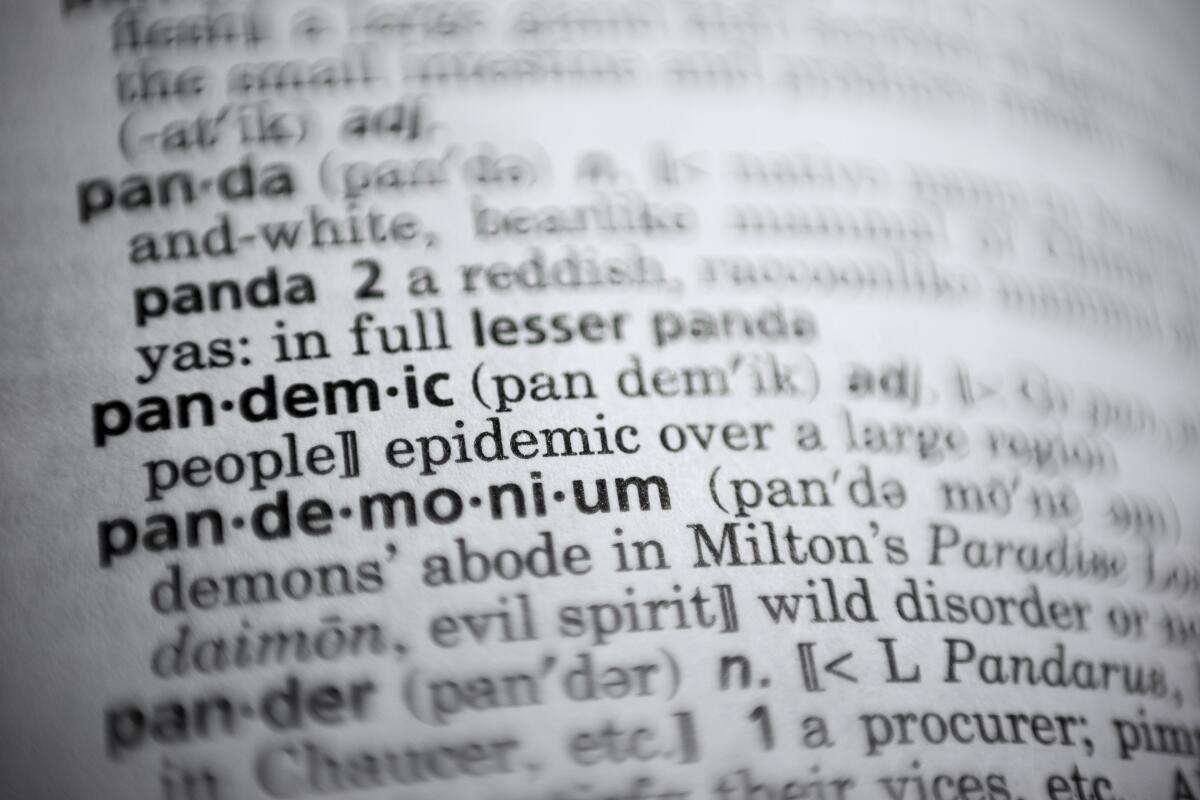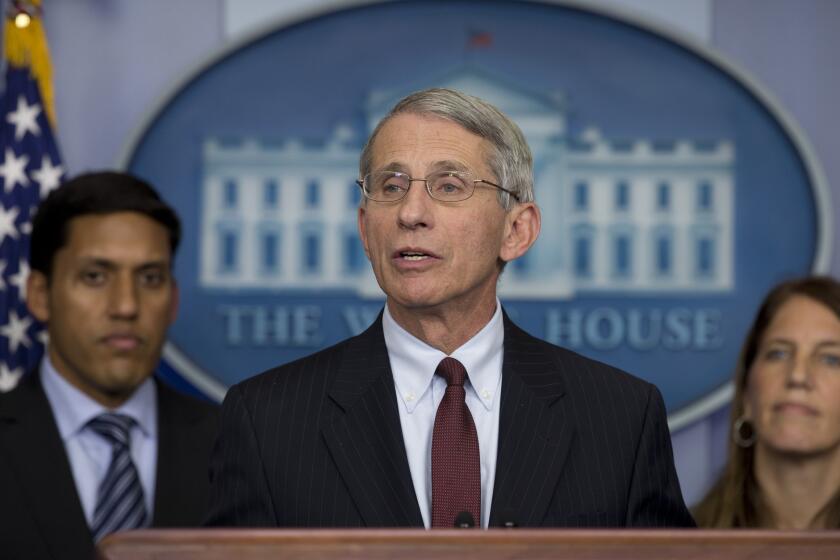‘Pandemic’ beats out ‘mamba,’ ‘kraken,’ ‘defund’ as Merriam-Webster’s word of the year

- Share via
NEW YORK — If you were to choose a word that rose above most in 2020, which word would it be?
Merriam-Webster’s choice for its word of the year, announced Monday, probably agrees with yours: “pandemic.”
“That probably isn’t a big shock,” Peter Sokolowski, editor at large for Merriam-Webster, said.
“Often the big news story has a technical word that’s associated with it, and in this case, the word ‘pandemic’ is not just technical but has become general. It’s probably the word by which we’ll refer to this period in the future,” he said.
The word took on urgent specificity in March, when the coronavirus crisis was designated a pandemic, but it started to trend on Merriam-Webster.com as early as January and again in February when the first U.S. deaths and outbreaks on cruise ships occurred.
On March 11, when the World Health Organization declared the coronavirus outbreak a global pandemic, lookups on the site for “pandemic” spiked hugely — up 115,806% compared with the same day last year. Site interest for the word has remained significantly high through the year, Sokolowski said.
With changes to everyday language, people are experts in social distancing, doomscrolling and super-spreaders.
“Pandemic,” with roots in Latin and Greek, is a combination of “pan,” for all, and “demos,” for people or population. The latter is the same root of “democracy,” Sokolowski noted. The word pandemic dates to the mid-1600s, used broadly for “universal” and more specifically applied to disease in a medical text in the 1660s, he said.
That was after the plagues of the Middle Ages, Sokolowski said.
He attributes the lookup traffic for “pandemic” not entirely to searchers who didn’t know what it meant but also to those on the hunt for more detail, or for inspiration or comfort.
“We see that the word ‘love’ is looked up around Valentine’s Day, and the word ‘cornucopia’ is looked up at Thanksgiving,” Sokolowski said. “We see a word like ‘surreal’ spiking when a moment of national tragedy or shock occurs. It’s the idea of dictionaries being the beginning of putting your thoughts in order.”
By now, you probably know the disease at the center of the global coronavirus pandemic is called COVID-19. But perhaps you don’t know why.
Merriam-Webster acted quickly in March to add and update entries on its site for words related to the pandemic. While “coronavirus” had been in the dictionary for decades, “COVID-19” was coined in February. Thirty-four days later, Merriam-Webster had it up online, along with a couple dozen other entries that were revised to reflect the health emergency.
“That’s the shortest period of time we’ve ever seen a word go from coinage to entry,” Sokolowski said. “The word had this urgency.”
“Coronavirus” was among runners-up for word of the year as it jumped into the mainstream. “Quarantine,” “asymptomatic,” “mamba,” “kraken,” “defund,” “antebellum,” “irregardless” (a word to make guardians of English shudder), “icon,” “schadenfreude” and “malarkey” were also runners-up based on lookup spikes around specific events.
Particularly interesting to word nerds like Sokolowski, a lexicographer, is “quarantine.” With Italian roots, it was used during the Black Death of the 1300s for the period of time a new ship coming into port would have to wait outside a city to prevent disease. The “quar” in quarantine derives from 40, for the 40 days required.
Spikes for “mamba” occurred after the January death of Kobe Bryant, whose nickname was the Black Mamba. A mass of lookups occurred for “kraken” in July after Seattle’s new National Hockey League franchise chose the mythical sea monster as its name, urged along by fans.
Country group Lady Antebellum’s name change to Lady A drove dictionary interest in June, and “malarkey” got a boost from President-elect Joe Biden, who’s fond of using the word. “Icon” was front and center in headlines after the deaths of Rep. John Lewis (D-Ga.) and Supreme Court Justice Ruth Bader Ginsburg.
English-speakers aren’t the only ones to contend with the COVID-19 crisis, of course. In Germany, the Assn. for the German Language also announced that a jury chose “Corona-Pandemie” (capitalized, as all German nouns are) for this year’s honor. The group said that the word identifies the “dominant issue of almost the entire year.”
The runners-up were “Lockdown” and “Verschwoerungserzaehlung,” or “conspiracy story.” “Black Lives Matter” took fourth place.
More to Read
Sign up for Essential California
The most important California stories and recommendations in your inbox every morning.
You may occasionally receive promotional content from the Los Angeles Times.















